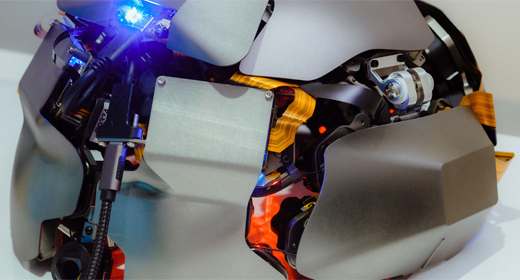by John: In the next few weeks, a company called Kernel will start sending a helmet worth about $ 50,000 that can read the minds of dozens of customers in the United States.

Helmets, each weighing a few pounds, have sensors and other electronic devices that measure and analyze the brain’s electrical impulses and blood flow at the speed of thought, and provide a window on how the body responds to the world. The core technology has been around for years, but is often found in room-sized machines that can cost millions of dollars and require patients to sit in a clinical setting.
Promises of more affordable technology leagues that everyone can wear and walk around are crazy. Excited researchers look forward to using the helmet to learn about the mechanics behind previous metaphysical experiences such as brain aging, mental disorders, concussions, strokes, and meditation and psychedelic excursions. Bryan Johnson, who spent more than five years and raised about $ 110 million (half of his own money) to develop it, says, “As a society, we need to brainstorm online to make progress on all the fronts we need.” helmet.
Johnson is the CEO of Kernel, which strives to make and sell thousands, even millions, of lightweight, relatively inexpensive helmets with the power and precision that neurologists, computer scientists, and electrical engineers are trying to do. Do this for years: Examine the human skull outside of university or government laboratories.
It should be noted that 228 investors went through Johnson’s sales area, and the CEO, who made a fortune in the payment industry from his previous company, reset his bank account to run Kernel last year. . “We had two weeks to lose our salary,” he said. Although much has yet to be proven in core technology, successful demonstrations shortly before the release of Covid-19 around the world convinced some skeptics that Johnson had a chance to realize his ambitions.
A key element of Johnson’s speech is “Know Yourself,” an ancient Greek phrase that emphasizes how little we have learned about the head since Plato. Scientists have used all kinds of tests and devices to measure our heart, blood, and even our DNA, but brain tests remain rare and expensive, and severely limit our knowledge of the organ that identifies us the most. “If you went to a cardiologist and asked how your heart was, you’d think they were crazy,” Johnson says. “You ask them to measure your blood pressure, your cholesterol, and all of that.”
The first Kernel helmets were aimed at brain research institutions and perhaps less noble companies who wanted to take advantage of ideas about how people thought about shaping their products. (Christoph Koch, a senior fellow at the Allen Brain Research Institute in Seattle, calls Kernel’s devices “revolutionary.”)
Johnson said he wants to lower the price of smartphones by 2030 and put a helmet on every American home; it sounds like a medicine. He said the helmets would eventually allow people to take their mental health more seriously, come together better, and explore the mental effects of the pandemic and even the root causes of America’s political polarization. If Johnson wanted the Biden administration to fund this type of research, he would be happy to sell a million helmets to the federations and get started. stable condition. “
Johnson is caught in a kind of dimension. Quantity is in front of what is known as the action of the ego. Almost every cell in the body has been analyzed and cared for by a team of doctors several times, and tests are now forcing it to look less than 43 years old, exactly ten years old. Accordingly, he wants to allow everyone to analyze, change and improve their thoughts. No one knows what the results will be and whether it is a good idea, but Johnson set himself the task of learning it.
Unlike many tech millionaire peers, Johnson grew up relatively poor. The third of five children born in 1977, he grew up in Springville, Utah. “We were very few and we lived a very simple life,” says his mother, Ellen Huff. A devout Mormon stayed home with the children whenever possible, earning a modest income from the rental panic on the other side of the family duplex.
Johnson remembers weaving his mother’s clothes and grinding wheat to make bread. “We weren’t like my friends,” he says. “They bought things from the shops, and we didn’t.” His father, a garbage collector and lawyer, had a drug problem and a job that led to his divorce from Huff. Deferred child support payments, weekend purchases and legal problems have all led to the exclusion. “After struggling for a while, my dad successfully repaired his life 20 years ago,” Johnson says. “Throughout their struggle, we have remained close and without conflict. He has been an unparalleled source of wisdom, advice, and stability in my life. ”
Johnson knew little of what he would do with his life until he completed his two-year church mission in Ecuador, where he interacted with people who lived in huts and whose walls were made of mud and straw. “The only thing I cared about when I got back was how I would do my best for most people,” he says. “I decided to be an entrepreneur because I didn’t have the skills.”
While at Brigham Young University, he started selling cell phones and service plans, and the sales team made enough money to hire him. He then invested in a property development company that went bankrupt and lent him $ 250,000. Going door-to-door to get out of the pit, he sold credit card processing services to small businesses. He soon became the company’s best seller.
It was the mid-2000s, and Johnson’s customers continued to complain about the difficulty of setting up and maintaining credit card payment systems on their websites. In 2007, he founded Braintree, a software company designed to make the process easier with smooth interfaces. He was successful and had a good time.
After registering with a number of restaurants, retailers and other small businesses, Braintree has become a selection agent for many startups ordering online services, including Airbnb, OpenTable and Uber. The company also made a big bet on mobile payments, and in 2012 bought Venmo for only $ 26 million. The following year, eBay bought Braintree for $ 800 million in cash, more than half of which went to Johnson.








































